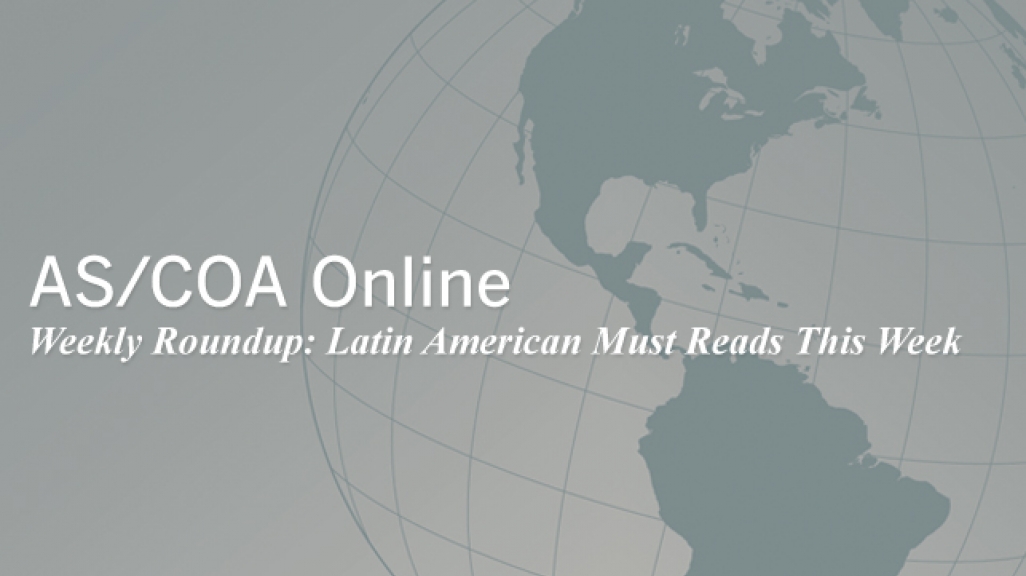Weekly Roundup: Mujica in Washington, Mexico's Teachers, Peru's Brazilian Beef Ban
Weekly Roundup: Mujica in Washington, Mexico's Teachers, Peru's Brazilian Beef Ban
Venezuela’s mediated talks stall, Colombia’s guerrillas call a ceasefire ahead of the elections, and Chile’s lower house approves tax reform.
Venezuela’s mediated talks hit a wall. On May 12, Venezuela’s opposition temporarily suspended working group discussions on the sidelines of the mediated talks with the government, citing repression of protesters. Foreign ministers from the Union of South American Nations postponed their May 15 visit to start another round of dialogue until next week. The opposition has said that the talks are “in crisis.” From Washington, Uruguayan President José Mujica weighed in on the latest turn of events, saying that “no one is going to be able to govern Venezuela in this climate of confrontation.”
Mujica goes to Washington. Uruguayan President José Mujica traveled to the United States on May 12 and met with U.S. President Barack Obama, discussing bilateral trade, education exchange, and the perils of tobacco, among other topics.
Read an article by COA’s Eric Farnsworth on why Mujica’s visit matters for U.S. relations with Latin America.
FARC and ELN to hold a ceasefire during Colombian vote. On May 16, two of Colombia’s guerrilla groups—the Revolutionary Armed Forces of Colombia and the National Liberation Army—announced a unilateral ceasefire from May 20 to May 28, to coincide with the presidential elections on May 25.
Read a post from the AS/COA Online election blog on the upcoming presidential vote.
Teaching in Mexico: nice work if you can get it. Analysis of Mexico’s education census by the Mexican Institute for Competitiveness uncovered corruption among teaching ranks: 70 teachers in Mexico earn more than President Enrique Peña Nieto and some 1,440 teachers on the payroll in Hidalgo state are centenarians—all supposedly born on December 12, 1912.
CEMEX chief passes away at age 70. El País profiles the life and business acumen of Mexico’s Cemex CEO Lorenzo Zambrano, who passed away this week and is credited with making Cemex Mexico’s first global brand.
Brazil's 15 richest families account for 5 percent of GDP. Forbes’ latest billionaire list shows that Brazil’s wealthiest 15 families are worth around $122 billion, equivalent to 5 percent of the country’s GDP. Plus, out of Brazil’s 10 largest conglomerates, 6 are family-run.
Peru becomes latest country to ban Brazil's beef. After a case of mad-cow disease was found in Brazilian beef last week, Peru prohibited beef imports from its neighbor, The Wall Street Journal reported. Algeria, Egypt, and Iran also banned imports from Mato Grosso state, where the disease was found.
Zeroing in on LatAm’s highest value exports. In an infographic, GlobalPost looks at the highest value exports of each country worldwide. In Latin America, food commodities are common, though Mexico’s highest value export is clothes and shoes, and Brazil’s is transport equipment.
Chile’s Chamber of Deputies approves tax reform. The lower house passed President Michelle Bachelet’s tax proposal on May 14; the bill now moves on to the Senate. The tax overhaul seeks to raise revenues, in part to fund education reform.
Guatemalan Congress denies genocide in resolution. On May 13, Guatemala’s unicameral Congress approved a resolution that denies that genocide took place in the country during the 36-year-long civil war. The text of the resolution says it is meant to promote a “lasting reconciliation.”
Who were the campaign strategists behind Panama’s presidential race? The Associated Press takes a look at the foreign campaign gurus involved in Panama’s May presidential election, examining a U.S. advisor’s role in helping Juan Carlos Varela win.
Immigration reform picks up steam in the DR. On May 15, President Danilo Medina sent a bill to Congress that would offer a path to citizenship for Dominican-born children of undocumented immigrants. Before it heads to a vote in the Chamber of Deputies, the lower house will send it to a special commission for examination.
The LatAm country that drinks the most alcohol per capita is... A new report from the World Health Organization found that Chileans drink the most alcohol per capita in Latin America, likely due to affordability and lenient alcohol laws, says Dr. Maristela Monteiro, a senior advisor for the Pan American Health Organization.







